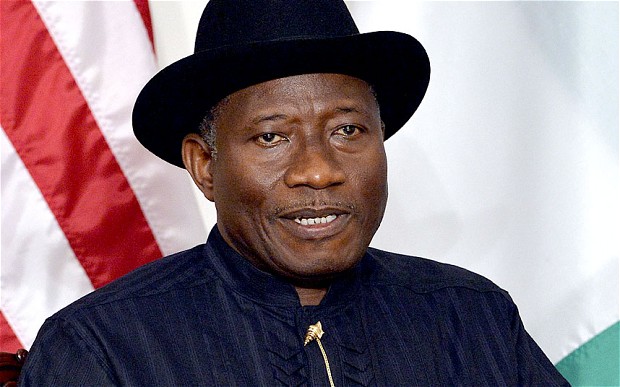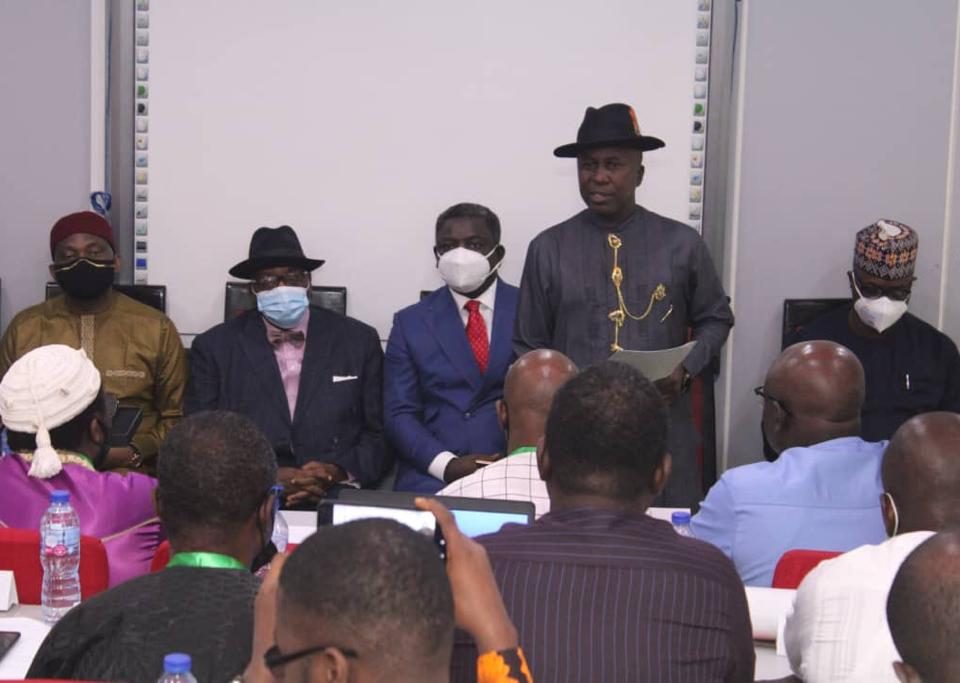
Resolving Rivers’ Political Crisis
August 25, 2013Welcome to SteveAzaiki.com
April 29, 2014Jonathan’s Looming Political Battles
Until a few months ago, President Goodluck Jonathan was striving hard to get the public to focus on governance, rather than politicking. Thus, whenever the issue of the 2015 presidential election popped up, and answers were demanded whether or not he would run, the President, or more frequently, his media handlers, retorted that the incumbent was focused determinedly on justifying the overwhelming mandate which he received freely and fairly in the 2011 general elections. He would rather proceed with the implementation of the Transformation Agenda, than be drawn into premature calculations of whether or not he would seek re-election. This was notwithstanding the fact that depositions in certain affidavits had asserted the incumbent’s constitutional right to contest the 2015 election.
Two recent events have altered that pussy-footing. The first is the formation of the All Progressives Congress (APC), an amalgamation of a number of political parties, which has automatically swollen the size and rank of the opposition. No one is left in doubt that the primary reason for the formation of APC is the 2015 elections, a fact which is constantly reiterated by leading figures of the APC whose bombast is to brag about how the party will thrash the ruling People’s Democratic Party (PDP) in the general elections in two years’ time. The other event is the sudden and dramatic formation of the so-called New PDP, a splinter group from the PDP, which announced its arrival after some of the party members stormed out of the PDP Special Convention on Saturday, August 31, at Eagle Square, Abuja. Nothing perhaps could have been more stunning and embarrassing than the fact that the ruling PDP, which is in charge of the Federal Government, complete with its paraphernalia of security and intelligence outfits, was caught off-guard. Assuming it was something worse, the effect and post-mortem could not have been any less catastrophic.
What happened that the intelligence agencies went into slumber ahead of a Special Convention, with all the hints of potential tension and trouble? Eagle Square had played host to a number of Conventions in the past; but attention is focused not just at the venue but at the various meeting places, where delegates and their leaders strategize and conclude before the formality of speeches and voting at the Eagle Square. Were the antennae of the intelligence agencies so blunted that they could not pick up vital hints about the walk-out and declaration of the self-styled New PDP? President Goodluck Jonathan, I believe, needs no further persuasion to interrogate this epic failure of intelligence, and then take appropriate remedial measures. If laxity of this nature is tolerated, no one can tell what might happen on bigger occasions.
While President Jonathan cannot as yet mount the rostrum and begin canvassing for votes for his re-election (because it violates the Electoral Act), he must develop a mental attitude that recognises quite clearly that he is now in an era of bare-knuckle politics. He should continue to concentrate on governance, to expand the returns from the implementation of the Transformation Agenda. But he and his team must also now devise strategies of continuity that will ensure success in the 2015 elections. No use pretending that the polls are about two years away. No use also pretending that the President does not want to be distracted from the challenges of governance. He has no constitutional impediment that bars him from seeking re-election; and there is no national interest factor that can be interpreted to mean that he should stand down after just one term. The gong has sounded loud and clear that there are political battles that lie ahead.
To realise the foregoing, there are a number of measures that are recommended for the President. First, let me provide a brief background. In almost all the states of the federation, where the opposition is in charge, they are having a free rein, to such an extent that there is the mistaken impression that there are no voices of reason to counter them, or that the opposition are doing so well in the states that they control, hence every other potential voice of dissent is silent. This state of affairs has led to what we see today. Every other political rascal or nitwit takes his or her turn to hurl insults at President Jonathan and his ruling party, at the centre. All problems are heaped on the President, even where these are problems of states and local governments.
The President and his planners must identify and deploy in the states credible and committed persons, who will provide an alternative view of events and occurrences in their domain, on the one hand; and on the other, be actively involved in propagating the achievements of the Federal Government. I am no apostle of hate or violence. But such persons as I am proposing to the President and his planners must also be ready to tackle the opposition in their states. They must be ready to muck-rake; they must be champions of alternative views; they must open the eyes of the electorate to the weaknesses of the states and councils where they are. They must create a true market place of ideas. In that circumstance, I doubt very much whether those who fire frequently at the President will have the peace or presence of mind to carry on with their current pastime.
The corollary to engaging the opposition in their domain is a revamping of the President’s media management team. Those now in charge of the President’s media are doing their best, but they could benefit from invigoration. If resources had always been a handicap, here’s an opportunity to leverage the media management. It is unthinkable, considering the achievements that the Goodluck Jonathan Administration is recording, that the propaganda of the opposition has drowned out positive acknowledgement of the incumbent Administration.
There are a few other moves the President should make. He and his planners must take a critical look at the states where he will encounter the stiffest opposition; or, identify those places where the current political irritants are making waves. The President must then proceed to counter the groundswell of opposition by recruiting the support of key powerbrokers in those places. That will serve to neutralize or reduce significantly the political losses the President might suffer in 2015.
I will give a few examples. Governor BabangidaAliyu of Niger State has been in the vanguard of those seeking to frustrate President Jonathan’s re-election bid. But Governor Aliyu has little influence outside Niger State. He is serving his second and final term. He is interested in who will succeed him. If the potential successor to Aliyu is not from the camp of former Head of State, Gen. Ibrahim Babangida, President Jonathan can make a deft political move, by currying the favour of Gen. Babangida with a firm pledge and promise to support Gen. Babangida’s anointed nominee to take over from Aliyu. Better strategy still if that anointed nominee is Gen. Ibrahim Babangida’s son.
Similar deft moves can be applied to Jigawa, Rivers, Sokoto, and Adamawa whose incumbent Governors are among the leading lights of the self-styled New PDP. In Lagos State, the President and his planners must exploit the often ignored grievances of power blocs in the state. It is largely because the PDP is tame in a state like Lagos that the opposition grew giant roots. Political structures must be revived and strengthened therein, and the APC given a run for their votes. Same goes for Oyo, Ekiti, Osun, and Ogun states. For, it is funny how some political pundits assume that the incumbent President is a write-off in nearly the entire South West zone.
In the political battles that lie ahead, President Jonathan should consider one other drastic step. He could dissolve the Federal Executive Council, and create new dynamics in the states as nominees scramble for chance and opportunity. But such nominees must be persons capable of leading the political battles in their respective states, in addition to running their assignments under the Transformation Agenda. However, where dissolution of the Federal Executive Council is considered undesirable, since there are apolitical members who are holding positions critical to the realisation of the Transformation Agenda, President Jonathan must nevertheless take the step of ridding his Cabinet forthwith of a number of ministers who are busy chasing their own political ambitions, rather than working for the President.
• Prof. Azaiki is the National Coordinator of the National Think Tank.
*****
The Guardian: September 12, 2013.


